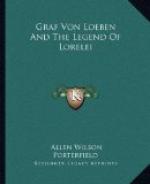[8] Eichendorff’s relation to Loeben can be
studied in the edition of
Eichendorff’s works
by Wilhelm Kusch, Regensburg. Vols. III,
X-XIII have already appeared.
For a poetization of Loeben, see
Ahnung und Gegenwart,
chap. xii, pp. 144 ff. For a
historical account of Loeben,
see Erlebtes, chap. x,
pp. 425 ff. It is here
that Eichendorff makes Goethe praise Loeben
in the foregoing fashion.
[9] There is no positive evidence that Goethe made
any such remark. In
his GesprAeche (Biedermann.
V, 270; VI, 198-99) there are
two references to Loeben by
Goethe; they are favorable but
noncommittal as to his poetic
ability.
[10] Cf. Die TagebUecher des GrAefen von Platen,
Stuttgart, 1900.
Under date of August 14, 1824,
Platen wrote: “Es enthAelt viele
gute Bemerkungen, wiewohl
diese Art Prosa nicht nach meinem Sinne
ist.” The reference
is to Loeben’s commentary to Madame de Staels
De l’Allemayne.
[11] Cf. Heinrick von Kleists Berliner KAempfe,
Berlin, 1901, pp.
490-96. The story in
question is “Die furchtbare Einladung.”
[12] Cf. Herm. Anders KrUeger, Pseudoromantik.
Friedrich Kind und der
Dresdener Liederkreis._ Leipzig.
1904. pp. 144-48. KrUeger also
discusses Loeben in his Der
junge Eichendorff. Leipzig. 1904.
pp. 88 and 128.
[13] Cf. Fouque, Apel. Miltitz. BeitrAege
zur Geschichte der deutschen
Romantik, Leipzig,1908.
In a letter to his brother. Fouque wrote
(January 6, 1813): “Ein
Dichter, meine ich, ist er allerdings, ein
von Gott dazu bestimmter.”
Fouque, however, realized Loeben’s many
weaknesses as a poet, though
at Loeben’s death he wrote a poem on
him praising him as the master
of verse technique.
[14] Cf. Kosch’s edition of Eichendorff.
XIII. 65. Loeben says: “In
Weimar war ich im vorigen
Winter bei Goethe; er war mir
freundlich.” The
“previous winter” was 1813.
[15] Cf. Kosch’s edition, XI, 220. The remark was made in 1807.
[16] Cf. Pissin. p. 25. The incident occurred
in 1803 and Herder died
in 1804.
[17] Cf. Kosch’s edition, XI, 308.
Lochen himself utterly condemned
this work later. See
Pissin, pp. 238-39, 267-08. Pissin gives the
number of verse and strophe
forms on p. 266.
[18] Cf. Pissin, p. 267. Uhland made the
remark in 1812—his own most
fruitful year as a poet.
[19] The story was published in 1817. The full
title is Das weisse
Ross, eine altdeutsche Familienchronik
in sechs und dreissig
Bildern. It is 160 pages
long.




